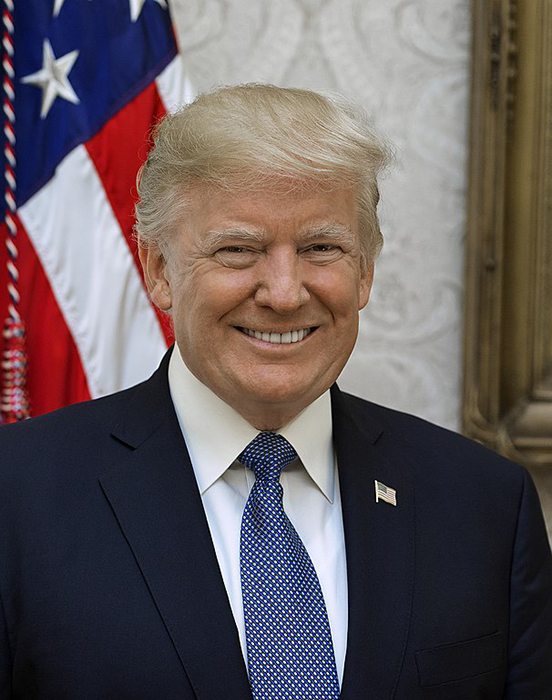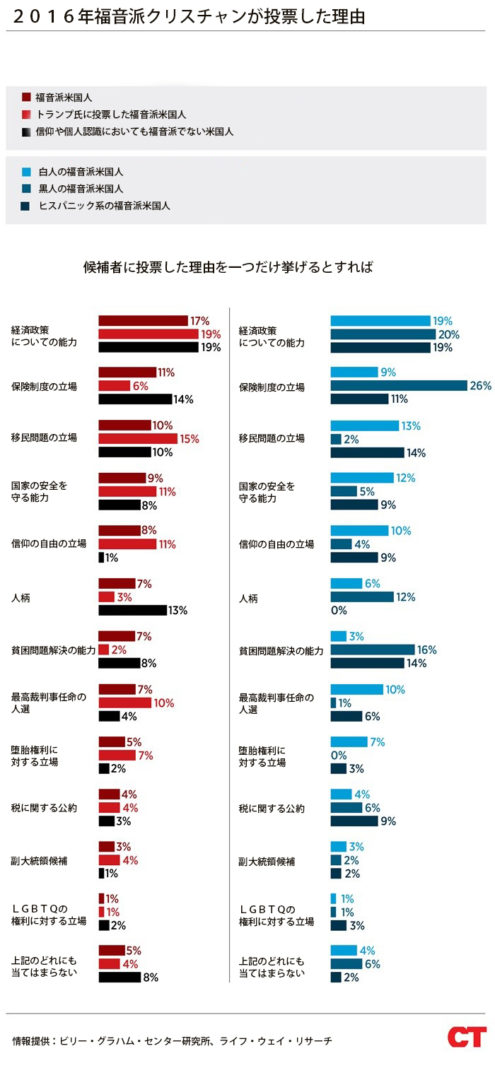2016年大統領選で、ほとんどの米国福音派クリスチャンが次のようだったといえる。「たとえ立候補者が理想とかけ離れていても、政治活動には熱心であるべきだ」
[toggle]The main takeway of the 2016 election for American evangelicals: they “feel committed to engaging the political process even when the candidates are far from ideal.” [/toggle]
ドナルド・トランプ米大統領(写真: Shealah Craighead)
これは、ホイートン大学のビリー・グラハム・センター研究所が出した最新の調査結果だ。「クリスチャニティ-・トゥデイ」11月号掲載の記事では、何度も報道された「2016年大統領選で白人の福音派クリスチャンの81%がトランプに投票した」という統計について考察した(後日掲載)。
[toggle]So concludes the Billy Graham Center Institute at Wheaton College from its new survey, released in CT’s November issue, examining the oft-repeated statistic that 81 percent of white evangelicals voted for Trump in 2016. [/toggle]今回、ライフ・ウェイ・リサーチ社に委託し、1000人の福音派クリスチャンを含む3000人の米国人を調査した。これにより、2016年大統領選で、白人と非白人の福音派クリスチャンがどのような選択をしたか、より理解が深まった(多くの調査では、白人と、自分を福音派だと考える人に限られているが、今回は、3人に1人は有色人種、3人に1人は民主党支持者だ)。
[toggle]The institute commissioned LifeWay Research to survey 3,000 Americans—including more than 1,000 with evangelical beliefs—in order to better understand how both white and non-white evangelicals made their choice in 2016. (While most surveys only focus on white and self-identified evangelicals, today 1 in 3 is a person of color and 1 in 3 is a Democrat.) [/toggle]すべての米国の福音派クリスチャン(米国福音同盟の調査協定の定義による)のこれまでの投票結果は次のとおり。
[toggle]Researchers found that among all American evangelicals by belief (as defined by the research protocol of the National Association of Evangelicals): [/toggle]53%が2016年ドナルド・トランプ氏に投票
46%が2012年にミット・ロムニー氏に投票
49%が2008年にジョン・マケイン氏に投票
69%が2004年にジョージ・W・ブッシュ氏に投票
68%が2000年にジョージ・W・ブッシュ氏に投票
45%が1996年にボブ・ドール氏に投票
46% said they voted for Mitt Romney in 2012
49% said they voted for John McCain in 2008
69% said they voted for George W. Bush in 2004
68% said they voted for George W. Bush in 2000
45% said they voted for Bob Dole in 1996[/toggle]
この調査により、2016年には「福音派クリスチャンのたった半分しか、特定の候補者に投票する人はいなかった」と分かった。つまり結論は、米国の福音派クリスチャンは「候補者より政策重視」なのだ。
[toggle]The survey found that “only half of evangelical voters characterized their vote as voting for their specific candidate” in 2016, leading researchers to conclude that US evangelicals are “more issue-oriented than candidate-focused.” [/toggle]ホイートン大学ビリー・グラハム・センター研究所の最高責任者であるエド・ステッツァー氏はこう語る。「来月6日の中間選挙で、政策重視の投票はまた繰り返されるでしょう」
[toggle] “I see no reason that focus on issues won’t be repeated next month,” stated Ed Stetzer, executive director of the Billy Graham Center Institute at Wheaton College [and a CT contributing editor and blogger], in a press release. [/toggle]「2016年、多くの福音派クリスチャンは、特定の問題や政策、または政党に投票するため、候補者の人間性は無視することを選びました。多くの人が立候補者を、自分の価値観や理念に合う個人ではなく、党を代表する人物と見ていたのです」
[toggle] “In 2016, many evangelicals chose to look past a candidate as an individual to vote for a specific issue, platform, or party a candidate represented, seeing the candidates more like objects of representation than as individuals whose values and ideals fit theirs,” he stated. [/toggle]ビリー・グラハム・センター研究所は、調査結果で明らかになったことを次のようにリストアップしている。
[toggle]The institute listed its initial key findings: [/toggle]①個人より政策のほうが大切。福音派クリスチャンの3分の2(67%)は、「たとえ政治的リーダーがキリストの教えに従う人生を送っていなくても、クリスチャンはその恩恵にあずかることができる」と考えていた。
[toggle]Issues matter more than character. Two-thirds of evangelicals (67%) by belief agree that “Christians can benefit from a political leader even if that leader’s personal life does not line up with Christian teaching.” [/toggle]②政党より中絶問題を重視。福音派クリスチャンが投票する際、中絶問題については一番の理由にはならなかったが、中絶反対の立場を取る福音派クリスチャンの4分の3(75%)が、「政党に関係なく、本当に中絶に反対する候補者に投票したい」と表明していた。非福音派クリスチャンでは、「政党を越えてまで中絶反対の候補者に投票する」としたのは半数(54%)だった。
[toggle]The issue of abortion appears to matter more than party. Although abortion was not the most important reason for evangelicals’ votes, three-quarters of evangelicals (75%) who are pro-life expressed a willingness to vote for a candidate who was truly pro-life, regardless of political party. Only half (54%) of non-evangelicals would cross party lines to vote pro-life. [/toggle]③意見の相違があった時に指導者を批判することには、多くの福音派クリスチャンが消極的だった。「政治的リーダーが重大な意志決定をするとき、それがたとえ自分の考えと違うものであっても、支持すべきだ」という項目に、福音派クリスチャンの43%が「そう思う」と答えた。48%は「そう思わない」と回答したが、「そう思う」とした非福音派クリスチャンが27%しかいなかったのに比べて多いことが分かる。
[toggle]Many evangelicals are reluctant to criticize their leaders when they disagree. Among evangelicals by belief, 43 percent agreed with the statement: “When a political leader is making important decisions I support, I should also support the leader when they say or do things I disagree with.” While 48 percent disagreed, this still represents a significant percentage in comparison to only 27 percent of non-evangelicals who agreed. [/toggle]④福音派クリスチャンは、非福音派クリスチャンに比べて、政治を重要だと考えている。3分の1近い福音派クリスチャン(30%)が、政治は「非常に重要」と回答した。一方、非福音派クリスチャンでは18%だった。さらに、非福音派クリスチャンの13%が、政治は「あまり重要でない」と答えたのに対し、福音派クリスチャンはその半分の7%だった。
[toggle]Evangelicals value politics more than non-evangelicals. Nearly one-third of evangelicals (30%) said politics is “extremely important,” while only 18 percent of non-evangelicals judged it so. And, nearly twice as many non-evangelicals (13%) said politics is “not very important” compared to 7 percent of evangelicals. [/toggle]「このデータは多くの人にとって当惑させる結果かもしれません」とセッツァー氏。「しかしながら、ここから見えてくることは、候補者の人柄について懸念を抱いている時でさえ、福音派クリスチャンが政治に参加し続けているということです」
[toggle] “This data may seem disconcerting to many,” stated Stetzer in the press release. “However, what we do see is that some evangelicals are seeking to stay engaged in politics even when they have substantial concerns about the individuals involved. [/toggle]「投票する理由は複雑です。『81%の福音派クリスチャンがトランプ大統領に投票』というニュースの数字などでは、なぜ人々が投票したかという理由やそのニュアンスが伝わりません。多くの福音派クリスチャンにとって、自分が本当に支持する候補者を見つけることは困難です。持ちうる選択肢の中で、いちばん合うと思う人を選ばざるを得なかったのでしょう」
[toggle] “People vote for complex reasons, and quick sound bites—like the “81% of evangelicals voted for President Trump” number—miss the nuance and reasons of how people voted,” he stated. “For many evangelicals, it appears it has been difficult to find a candidate they can fully endorse and they are left choosing what they see as the best fit among the choices they have.” [/toggle]ビリー・グラハム・センター研究所による調査結果の解析は続けられており、「クリスチャニティ-・トゥデイ」ではその詳細が明らかにされ次第、アップデートする予定だ。
[toggle]The institute’s analysis of the survey is ongoing, and CT will update this post as more details are released. [/toggle]以下は、「クリスチャニティ-・トゥデイ」2018年11月号から、セッツァー氏の個人的な解析をもとに「クリスチャニティ-・トゥデイ」が作成したものだ。
[toggle]Below is one of CT’s initial examinations of the institute’s findings, based on Stetzer’s personal analysis from CT’s November 2018 issue. [/toggle]
執筆:ジェレミー・ウェバー
本記事は「クリスチャニティー・トゥデイ」(米国)より翻訳、転載しました。翻訳にあたって、多少の省略をしています。
